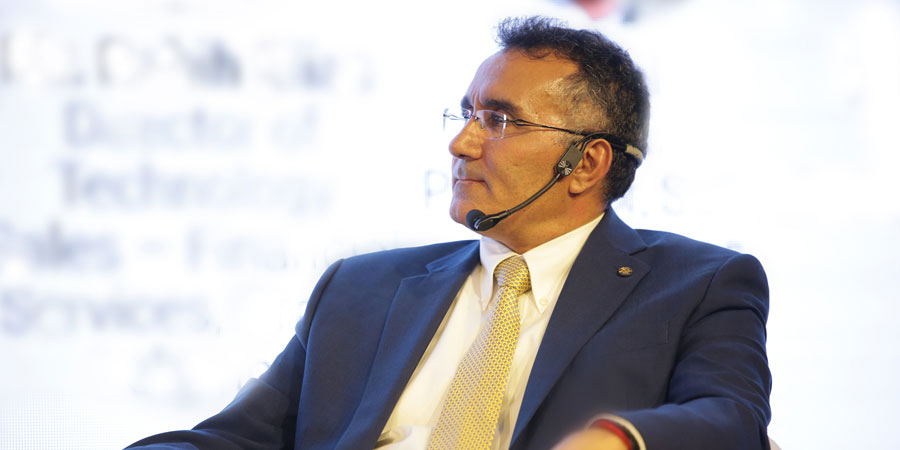The 12th Telecom Review Leaders’ Summit which was held in Beirut gathered the ICT industry’s leading experts and CxOs, as well as specialized organizations and governmental entities working to reinforce the deployment of new technologies. The International Telecommunications Union (ITU) was represented by Dr. Bilel Jamoussi, Chief, Study Groups Department, Telecommunication Standardization Bureau, ITU who, in an exclusive interview with Telecom Review, discussed the importance of financial inclusion and highlighted the Union’s role in the 5G era.
Dr. Jamoussi was part of the fintech panel which aimed to focus on how technology disrupted the financial sector and the evolution of mobile payment methods with the advent of smartphones and fintech applications.
In the interview, the ITU Chief highlights the role of ICTs in the banking sector and emphasizes the need to promote financial inclusion in order to achieve one of the United Nations’ key Sustainable Development goal.
While the world is getting ready for 5G, the ITU has also been playing an important role. What approach is the ITU adopting towards 5G?
This year is a great year for 5G. At the ITU, we are preparing for the World Radiocommunication Conference which will be held on October 28th in Sharm el-Sheikh in Egypt, where the world will get together to read on the spectrum and frequencies to drive 5G deployment.
In addition to the radio aspects, there is a lot of innovation in the core network where we are moving into a more packetized network. We are getting the cloud computing closer to the end user to reduce the latency and we’re providing new and innovative technics in the 5G area.
The combination of all these technics, including machine learning and artificial intelligence to manage the 5G network, is some of the innovative standards and regulatory frameworks that the ITU is currently working on. We’re very excited about this year because for us, it’s the beginning of the 5G era.
The Arab ICT Organization launched the first edition of the “Arab Digital Banking Excellence Award” in Tunisia and you were part of it. Can you tell us more about it and where does its importance lie?
The Digital Banking Award Ceremony was held in Tunis about a month ago and was really the first time we create a connection between the banking sector and the telecoms sector. This is a part of the digital transformation we’re seeing around the world where ICT is enabling other sectors – in this case the banking sector.
Two key organizations – the Arab ICT Organization and the Union of Arab Banks got together to raise the bar and have put a set of KPIs for the banking industry in the Arab world to embrace digital and financial technologies and provide better services for the citizens in the Arab world.
The award has brought the attention to what’s possible in the banking industry. We have seen many leading solutions in the Gulf countries and in the Middle East and North Africa regions and the award ceremony has allowed us to put the spotlight on the interconnection of the sectors and on the progress and advancements that have been achieved.
Even though consumers have started to trust mobile payment more, but there are still some concerns about trust. What do you have to say about it?
The mobile phone, whether a feature phone or a smartphone, offers an opportunity for much bigger financial inclusion. Today, there are 1.7 billion adults that don’t have a bank account or access to any banking service. Out of those 1.7 billion, there are 1.2 billion adults who have a mobile phone.
So, the mobile phone is a great enabler of financial services, however, we have to insure that the consumer trusts the services it offers and will eventually use them. There are a number of security aspects linked to the transaction process itself, such as insuring that the quality of the network is good enough for the transaction to happen.
This what we have been working on at the ITU to promote financial inclusion and provide financial services both for the developing countries and the developed countries to embrace strong authentication technics using smartphones and biometrics to increase the trust level when using a mobile phone.
In your opinion, why is financial inclusion important?
Financial inclusion leads to poverty reduction which is one the United Nations’ Sustainable Development Goals. By having these 1.7 billion people contribute to the economic sector through the mobile phone, they will be able to have a bank account which will allow them to make or receive payments and then the more they use these financial services, they will be able to get microcredits.
Can you give us your feedback on the 12th Telecom Review Leaders’ Summit?
This is my first time in Lebanon and I’m glad to be here today. There is a clear focus on the digital economy as it was stated by His Excellency Mohamed Choucair, Minister of Telecommunications in his keynote. We also heard from a number of CEOs and CxOs present here today. What is very impressive was the level of maturity and passion about using ICTs, in addition to the 5G demos that were showcased. It was a pleasure seeing all of this happening in Beirut which will have a great impact on the whole region.
